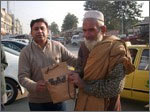Living Pakistan/A dish always too full
It all started one night at dinner in the restaurant of a hotel: the people ordered more food than we could eat, the offer was richer than there was really need. And so that Sayyeda Zoone Abbas and hes family began to think of the enormous waste of food that plagues Pakistan as the rest of the world, and the consequent inequality in the distribution of the same.
At Sayyeda parents have asked to finish studies before to help her give birth Tha-li (www.thali.org.pk ), the organization that since 2007 works in Islamabad and Rawalpindi to collect surplus food and distribute it to those who need it. The first to be contacted were restaurants and fast food: hard to get food to them, not for lack of generosity, but because each company has different policies and also request many bureaucratic procedure. Exceptions fortunately are everywhere and some restaurant managers in exchange for anonymity took the responsibility to donate surplus food.
The first rule of Tha-li is taste firsthand before deploying and the rules are strict: it’s because during the summer and with the chronic shortage of electricity throughout the country they can not give milk, yogurt or vegetables; and also because supermarkets (which in many countries are actively involved in the distribution of surplus food, see the recent French law) in Pakistan have the bad habit to affix a new label to the expired food, so they can resell it in defiance of the law. So the food is collected by individuals (for example, alert Tha-li when they held a wedding banquet, so that they can be ready for harvest), or prepared and distributed first in Rawalpindi or in some public schools of the capital, where children are free to attend but do not receive the meals.
In time, the best sponsors have become their own, kids. Sayyeda and her husband (who now works with her) have realized that educating the thrift and combat waste of food can only start from education and then have added to their business meetings in primary schools and now the students themselves teach their parents how to pack up the leftover food at home or simply put less on their plate.
The work, still, does not stop there. There is the distribution of food and drink to those who work at night in the streets or assist relatives in hospital coming from afar, the distribution of food to families so that they can survive a whole month; fundraising, volunteering and active CSR (Corporate Social Responsibility), which is the involvement of private companies in the promotion of social activities. For Thali did it a big telecommunications company, but Pakistan is still a long way to understand that social campaigns are an instant investment for companies, especially for the return of image. Now Syyeda is pointing to larger organizations, such as FAO and the policies of government, because the fair distribution of food has become a priority of the Parliament in the fight against social injustice. And during the month of Ramadan in the work certainly does not lack.
Ps. In Pakistan there are no data on the waste of food on the tables of families or in public places. But the only numbers related to tons of food wasted annually during collection or transport, refer to many tons per year, according to the WFP (World Food Program). More specifically, the Institution of Mechanical Engineers speak of 16% of the crop lost every year, equal to 3.2. million tons (2013 data).
Ps2. In the country there aren’t appropriate policies for the matter, neither tackling the problem of the redistribution of excess food as educational theme. This video was produced in Ireland and would be a useful best practice if adopted also in Pakistan: https://www.facebook.com/helnevideo/videos/1415500125440851/?pnref=story.








